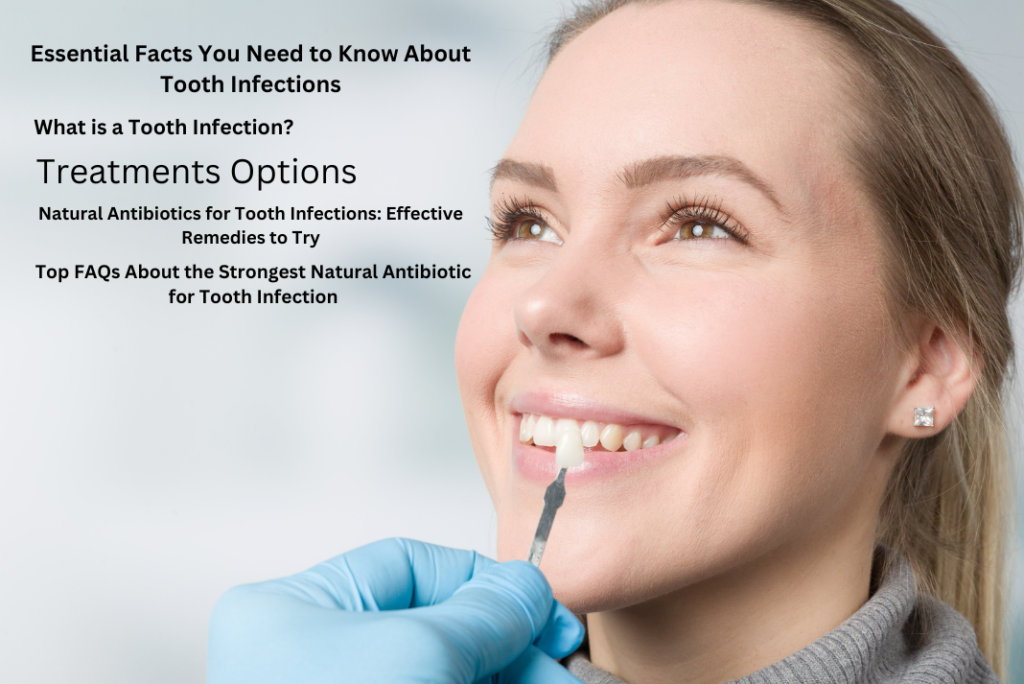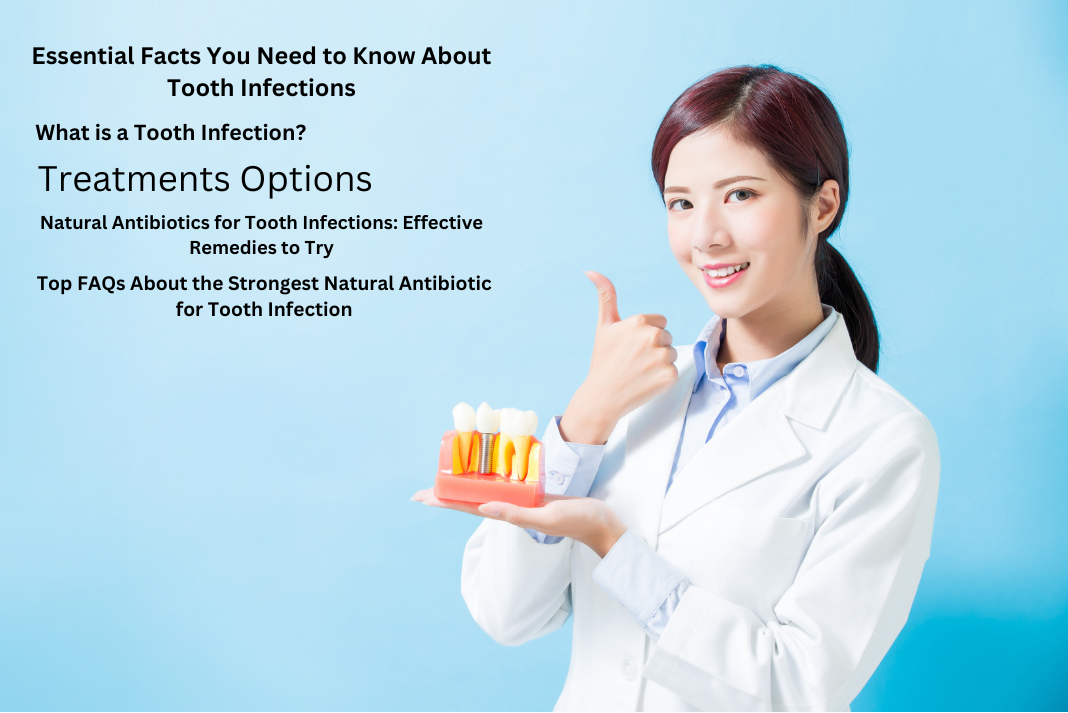Tooth infections go beyond pain and can cause severe health problems if not promptly treated. Here are key facts that one needs to know to comprehend, prevent, and manage tooth infections.
Table of Contents
What is a Tooth Infection?
A tooth infection or dental abscess results from bacteria penetrating the inner part of a tooth, known as the pulp, which contains nerves and blood vessels.
Causes
Decay in teeth: Unfilled holes in teeth can lead to invasion by bacteria.
Gum Disease: The disease causes the withdrawal of gums, exposing the roots to
Bacterial effects.
Cracked Teeth: A crack in a tooth or fracture may provide an entrance for bacteria.
Poor oral hygiene: Not brushing and flossing correctly might mean that food particles get trapped between the teeth, leading to infection.
Signs to Watch For
Intense Toothache: this may be constant, pulsating, or radiating to your jaw, neck, or ear, among other areas.
Swelling: Inflammation in the face, cheek, or lymph nodes.
Fever : This is an elevated body temperature due to infection in your body system.
Bad Taste: Pus might be coming out from the abscess, leading to a foul taste in your mouth.
Sensitivity: Feeling discomfort when taking hot or cold foods on teeth is also a sign of infection.
Kinds Of Dental Abscesses
Periapical Abscess (at the tip of the tooth root)
Periodontal Abscess (found on the gum near the side of the root)
Gingival Abscess (it occurs on gum, not affecting the tooth or periodontal ligament)
Diagnosis
A dentist will typically diagnose a tooth infection through:
Physical Examination: assessing symptoms and examining the affected area
X-rays: taking pictures to determine how far spread it has gone
Pulp Vitality Tests: checking whether the dental pulp is healthy
Treatments Options
Take antibiotics: they fight bacterial infections, although the condition cannot be resolved permanently.
Drainage involves letting off the abscess so that pus and pressure are relieved.
Root canal: cleans out contaminated pulp, sealing the tooth to prevent reinfection:
Extraction: Tooth removal in cases of extensive damage
Home Remedies: (Temporary Relief)
Saltwater Rinse: To ease discomfort and cleanse
Over-the-counter Pain Relievers: Ibuprofen or acetaminophen can relieve pain
Cold Compress: Swelling reducer and numbs pain
Possible Complications
If left untreated, a tooth infection can lead to severe complications, including:
Spread of Infection: Bacteria can travel from one body part to another, leading to severe conditions like sepsis.
Bone Loss: There may be damage to bony structures surrounding the root area due to infection.
Sinus Infection: The upper sinus may be infected by tooth abscesses.
Ludwig’s Angina: This refers to a life-threatening infection that has been extended into the mouth, floor, and neck.

Prevention Tips
Maintain Oral Hygiene: Brush twice daily and floss regularly.
Regular Dental Check-ups: Visit your dentist every six months for cleanings and exams.
Healthy Diet: Reduce sugary foods and drinks that contribute to cavities.
Protect Your Teeth: Use a mouth guard when playing sports; avoid chewing hard foods.
When to See a Dentist
If you have severe persistent toothache
Taking measures to maintain good oral hygiene and seek prompt treatment can lower the probability of getting a gum infection. If you suspect an infected tooth, it is essential to see your dentist promptly for correct detection and remedy.
Natural Antibiotics for Tooth Infections: Effective Remedies to Try
Tooth infections can be a real pain; indeed, they can be. Nevertheless, if you have any dental problems, it is always best to visit your dentist. However, there are natural antibiotics on the market that can relieve symptoms and even prevent an infection from occurring. Here are seven natural remedies for you:
Garlic
Why It Works: Allicin, which is found in garlic, gives it powerful antibacterial properties.
How to Use It
• Squeeze the juice of an allicin bulb into a container.
• Apply the squeezed onion directly onto the damaged area.
• After about one minute or two, rinse off with warm water.
Clove Oil
Why It Works: Clove oil contains eugenol, a natural antiseptic and anesthetic that relieves pain and fights infections.
How to Use It
• Take cotton wool balls and dip them into clove oil.
• Put on the infected tooth.
• It should remain for 10 to 15 minutes before rinsing off.
Turmeric
Why It Works: Curcumin, the main constituent of turmeric, has firm anti-inflammatory and antibacterial characteristics that enhance its effectiveness against these diseases.
How to Use It
• Mix turmeric powder with a small amount of water until it becomes a paste-like substance.
• Paste this mix where it hurts most in your face.
• Rinse after ten minutes using plain water.
Salt Water Rinse
Why It Works: Antiseptic salt helps minimize bacteria, reducing bacterial growth and inflammation in gums.
How to Use It
• Dissolve half a teaspoonful of salt in one cup of warm water.
• Rinse your mouth repeatedly with this saline solution for thirty seconds.
• Finally, spit it out and repeat this at least thrice daily.
Tea Tree Oil
Why It Works: The oil is well known for its antimicrobial and anti-inflammatory properties.
How to Use It
• Mix several drops of tea tree oil with a carrier like coconut oil.
• Use a cotton swab to put the solution in the tooth that has been infected.
• Rinse out after 5 minutes – 10 minutes.
Onion
Why It Works: Onions have strong antibacterial and antimicrobial effects that can assist in fighting infections.
How to Use It
• Bite into raw onions close to your decayed teeth before spitting them out after a few minutes.
• If biting is painful, you can place a small piece of onion directly on the infected area.
Ginger
Why It Works: Ginger, which has natural anti-inflammatory and antibacterial properties, is another excellent remedy for tooth infections.
How to Use It
• Grate about one inch of ginger root.
• Place the grated ginger on top of the painting gum area or the tooth itself.
• Leave for some time (about five) before washing away.
When to See a Dentist
Although such natural antibiotics may temporarily alleviate pain, they are not an alternative to professional dental care when one faces severe pain and swelling. If infection remains, it is essential to consult a dentist immediately.

Top FAQs About the Strongest Natural Antibiotic for Tooth Infection
Tooth inflammations are usually very painful and disturbing, calling for prompt remedies on the individual’s part. Even though conventional antibiotics are often recommended, the preference for alternative approaches with lesser side effects has increased. Here, we have answered the most common inquiries regarding the best natural antibiotics to use when one has a tooth infection.
What is the most potent natural antibiotic for a tooth infection?
Answer:
For example,
Many people consider garlic one of the most powerful natural antibiotics for tooth infections. This is because it contains allicin, which has significant antibacterial action. When garlic is crushed or chewed, it releases allicin, which can help fight bacteria that cause infection.
How can I use garlic to treat a tooth infection?
Answer:
For instance,
To use garlic for a tooth infection, crush a clove and apply it directly to the area where you feel pain. Alternatively, chewing raw garlic releases allicin. Garlic may cause a burning sensation; hence, after applying it, rinse your mouth thoroughly.
Are there other natural antibiotics besides garlic?
Answer:
Several other naturally occurring substances have antibiotic properties, such as;
• Clove Oil: It contains eugenol, which is well known for its potent antimicrobial and analgesic activities
• Turmeric: Its primary constituent, curcumin, is known to exhibit both anti-inflammatory and antimicrobial potential
• Coconut Oil: Helps reduce oral bacteria, especially in oil-pulling
How effective are natural antibiotics compared to conventional antibiotics?
Answer:
One can say that,
Natural antibiotics may be helpful in some mild to moderate cases of dental abscesses, especially during their onset stage. Nonetheless, they might not be as efficacious as conventional ones in severe instances. Nevertheless, dental professionals must always be consulted if symptoms persist or worsen.
Can natural antibiotics prevent tooth infections?
Answer:
Nonetheless, natural methods and good oral hygiene practices are essential in preventing dental infections. Regular brushing, flossing, and dental check-ups are vital in maintaining oral health.
Are there any side effects of using natural antibiotics?
Answer:
Natural antibiotics have fewer undesired effects than synthetic antibiotics. Nevertheless, they still tend to be reactive for some people. For example, garlic can cause a burning sensation, while clove oil sometimes irritates gums. Use these remedies cautiously and consult a dentist when experiencing adverse reactions.
When should I see a dentist for a tooth infection?
Answer:
You should get treatment from a dental clinic if;
• Your pain is too severe or continuous
• You have swollen face or gums
• You are suffering from fever
• The affected tooth has pus
• Natural products fail to improve the condition after a few days
Conclusion
While natural substances like garlic and clove oil act as natural antibiotics that alleviate pains caused by dental abscesses, dentists consider them adjunctive therapies rather than replacements for professional dental care, mainly where suspected cases of such an infection occur. If any signs of an infected tooth appear, one must first talk to a qualified dentist who will determine whether it needs treatment or not. Maintaining oral hygiene through regular dentist visits helps protect against infections and promotes good overall dental health.

